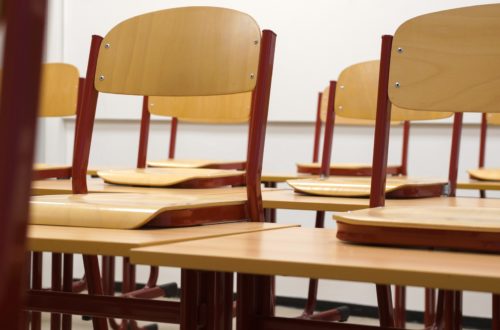
Tips to Avoid Summer PCS Slide
By Amanda Trimillos
Traditionally, the end of the academic year signals the beginning of summer camps and long hours at the pool for students. While the fun in the sun activities take place, parents express concern behind the scenes that academic skills begin to decline with each passing summer day. This decline in reading and math skills is often termed summer slide.
For military-connected students, this time of year often adds a different experience. Summer means packing the house and moving across country or an ocean to settle in at a new duty location. These students follow their active-duty parent to wherever the military determines is their next home and may miss opportunities for summer camps and extended hours at the pool.
Unfortunately, what they do not miss in a PCS summer is the summer slide conundrum. Military-connected students may not see a decline of academic skills because they were playing by the pool, but rather because they were in a car or plane relocating to a new home. For them, the summer slide becomes the PCS slide.
Thankfully there are several ways to beat both the traditional summer slide and military-connected student PCS slide!
Teacher Recommendation
Start planning ways to prevent a summer PCS slide by first talking to the student’s teachers. They know your student’s abilities and upcoming learning expectations, and they often have ready-made resources to support students. The partnership of the student advocacy team in creating a PCS slide prevention plan is pivotal to ensuring student growth.
- Skill Recommendation: Ask if they have any recommendations on specific skills the student is either lacking or that will need strengthening prior to starting at a new school.
- Teacher Resources: Ask if the teacher has any workbooks or skill packets she can build for the student prior to travel.
- Online resources: Ask if there are school sponsored online resources the student can continue to access through the move that directly meet the student’s need. If the current school does not offer online resources for summer access, reach out to the new school and request early student access.
Read, Read, Read
The best way to beat a decline in reading skills is to ensure students have access to books and other reading material. Reach out to the new school to see if they have an already designed summer reading program, suggested reading list, or set of summer reading assignments.
- E-reading: Help students download audio books as well as e-books. Since these books are downloaded on a device, they can go anywhere with the student without worry about returning to a physical library. A mix of audio and e-books allows students to alter between reading on their device and listening to a good book through headphones. Or enjoy a family audio book together to break up the trip. The Morale, Welfare, and Recreation (MWR) site offers a free digital library system. To access the resources, select from the featured items or use the search app. Certain libraries may require you to register and create your own account, but the resources are still free.
- Magazines: Prior to the move, help the student stock up on reading material. Consider holding magazines back from moving boxes or purging exercises. Magazines are often small and light enough to travel in a student pack. The beauty of magazines is that as the student finishes reading, the magazines can be donated or recycled throughout the journey.
- Incentive Reading: Use the base library at the PCS destination. Many base libraries participate in summer reading challenges through DoD-MWR Libraries Summer Reading Program. These reading challenges track how many minutes a day students read, and offer prizes for meeting weekly goals. It is possible to sign up with the program at the future base, keep track online of reading minutes, then collect prizes upon arrival at the new location. The reading theme for 2021 is Reading Colors Your World.
- Car Games: Before heading out on the long PCS drive or flight, brainstorm travel reading games that help pass the time and support reading skills. Games like Car Bingo, I Spy, and the ever-favorite ABC sign games are all simple games that encourage reading as well as family conversations. To play Car Bingo, create or buy bingo cards with items you may see on your trip. Mark out those items as you drive. The first person with Bingo or a blackout wins that round. For Car ABC, search for road signs with the different letters of the alphabet, starting with A and ending with Z. Each family member calls out the word that has the next letter in the alphabet, and the first person to Z wins!
Everyday Math:
Just like supporting reading skills during a summer PCS, the best way to beat a decline in math skills is to ensure students continue practicing their daily math.
- Flashcards: Bring or create a set of flashcards that support the student at their math level. These can be plus and minus math facts for younger students or multiplication and division for older students. High school students can create math flash cards that relate to the formulas and measurement conversions that best align to their higher level math classes like algebra, geometry, and calculus.
- Gas Math: Before traveling, have the student calculate the number of miles to the end location. For multiple-day travel, the student can figure out how many miles will be traveled each day and estimate how much gas will be used throughout the trip. This exercise will lend itself well to determining price per gallon and estimating how much money should be budgeted for gas during the trip. Follow up with each gas stop to update actual calculations. By the end of the trip compare budget predictions with actual gas usage and cost.
- Food Math: Use a similar budgeting practice for food vs actual cost of meal and snack purchases to help students learn real-life math and budgeting. Encourage students to practice quick calculations of taking family member meal orders, adding the menu price plus tax, and calculating the meal cost before the cashier or waitress delivers the bill. How close to the final bill was the student able to estimate, round, or calculate? Add in the next quick-check challenge of determining returned change when paying for snacks with cash.
- Car Games: Math games in the car are often just as easy as reading car games. For younger students, Car 1,2,3 games (the ABC sign game above but searching for numbers one through 10 or 100), Shape Searches, and What’s My Number guessing game (one person thinks of a number, the others try to guess the number in as few tries as possible; after each guess the person says whether the number is greater or less than the guess).
Social Studies and Science
These two academically core subjects are not typically discussed in supporting students during a summer or PCS slide. The skills needed for these classes are often but not always supported through strong reading and math skills. But military-connected students have unique opportunities to support these skills during a PCS and can bring an atmosphere of extra fun during the trip.
- Map Planning: Give the student several different maps and help them map out their route. If traveling across several states, a map that includes the entire trip helps the student visualize the move. When looking at the map, the student can point out geographical points of interest to include national parks and important cities or landmarks.
- Research It: Prior to pulling out, help the student find books at the library about the end destination and any stopping points along the way. Grab a book for each state, historical event, or famous (or not so famous) location. The student can make notes from the books and prepare to be the tour guide throughout different stages of the trip. If you borrow physical books, remember to return the library books before the actual move!
- Map It Bingo: Print off a map of the United States. Have players watch for license plates from different states and color in the map accordingly. By the end of the trip talk about if there were any states missing or states they did not expect to see on their trip.
- Data Collection: Choose a category and a designated amount of travel time to collect data. Perhaps track car colors, building types, or animal sightings. Keep track through tally marks and compare data results at the end of the collection time. This game easily transitions into a classification game.
- Classification Games: Pick a category (perhaps a category already determined by the data collection above). Categorize objects into classifications such as living/nonliving; species/classifications; food-chain placement.
While many military-connected students and parents worry about the effects of a summer slide and the even stronger impacts of a PCS slide, the good news is these times of transition can be used to open new opportunities for real-world learning. With a little planning and some creativity, military-connected students can use their PCS transition to strengthen skills. Summer does not have to mean a regression of academic skills. Rather than a slide backward, summer can offer opportunities to experiment with and practice real-world math, reading, social studies, and science skills even if a student is on the move.
Amanda Trimillos, EdD, is a military spouse, mother, and National Board-Certified Teacher with extensive experience teaching military students in the United States and overseas. Amanda has experienced multiple PCS transitions as both a teacher and parent, always looking for ways to make a PCS academically meaningful for her students and her own children. She is coauthor of Seasons of My Military Student: Practical Ideas for Parents and Teachers.
More about supporting students during transitions:


